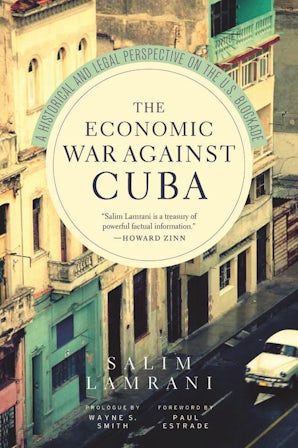Three MR Press books on Cuba reviewed by Counterfire

The Economic War Against Cuba: A Historical and Legal Perspective on the U.S. Blockade, Race in Cuba: Essays on the Revolution and Racial Inequality, and One Day in December: Celia Sánchez and the Cuban Revolution, all recently published by Monthly Review Press, are reviewed by Dominic Alexander for Counterfire.
The contradictions of the Cuban revolution are evident taking together three new books, each sympathetic to the revolution, on different aspects of Cuban history and society
If there were any question that the decades-old system of American sanctions against Cuba was unjustifiable and deeply immoral, this statement of a US official in 1960 should dispel it:
‘The majority of Cubans support Castro … every possible means should be undertaken promptly to weaken the economic life of Cuba … a line of action which … makes the greatest inroads in denying money and supplies to Cuba, to decrease monetary and real wages, to bring about hunger, desperation and overthrow the government’ (Lamrani, p.73).
The use of sanctions as a weapon against the civilian population is revealed particularly clearly here. Cuba has been a target of American imperialism even before the latter’s intervention in the Second Cuban War of Independence in 1898, which brought the island fully within the US sphere of domination. The severity of the present blockade makes certain accomplishments of the Cuban state, such as its medical programmes, highly impressive. Nonetheless, sanctions have also done enormous damage to Cuban society; Lamrani quotes an estimate that the economic siege has cost Cuba $751 billion in the more than five decades since its beginning.
… Lamrani’s book on this economic war is very clear, focused and succinct, while being informative and well-referenced. As an introduction to the issue it is highly recommended. It is remarkable that the sanctions regime has not crushed the Cuban state, particularly during the ‘special period’ after the collapse of the Soviet Union. It is all the more remarkable that under this pressure Cuba has been able to construct a widely-admired medical system, amongst other things. And yet, as another new book on Cuba makes clear, the island’s society does suffer from some very severe internal problems.
One of the first reforms introduced by the 1959 revolution was the abolition of all segregation by race in Cuba, but while this was important, the pressure to defend the revolution, against criticism and pressure from outside, has made it difficult to raise issues of racial inequality. Indeed, in 1962 the Second Declaration of Havana declared that the problem of race in Cuba had been solved (Morales, p.21). As the collection of articles in Estaban Morales Domínguez, Race in Cuba, shows, this was far from being the case. Even worse: ‘According to the prevailing view after 1962, in the midst of the political confrontation of those years, anyone who critically analyzed racism was playing into the hands of those who wanted to socially divide Cubans’ (Morales, p.22). The implication here is that raising the question of racial inequalities in Cuba was to undermine the national resistance to US aggression.
The situation has relaxed sufficiently for Morales to produce a range of essays addressed to various audiences which are certainly critical of the stance taken by the Cuban state in 1962, which was ‘an error of idealism and wishful thinking’ (Morales, p.22). Thus despite the abolition of segregation, ‘it was overlooked that many of the poor were black, which represents an additional disadvantage even within present-day Cuban society’, where, Morales admits, ‘white Hispanicism’ remains dominant, despite children from all backgrounds having ‘the same opportunities’ (Morales, p.23). Equal opportunity, in the basic legal sense, is hardly adequate to removing structural racism from a society, as is clear enough in the British or US experience, so it is somewhat remarkable that Morales has to argue the case in the Cuban context.
… That the Cuban revolution was not a proletarian revolution is one impression that could be garnered, although not, it seems likely, by the author’s intention, from Nancy Stout’s eminently readable biography of one of the leaders of the Cuban revolution, Celia Sánchez. One Day in December provides a fascinating account of the revolution from the point of view of a close confidant of Castro, who herself was a key leader of the underground networks that did so much to make a relatively marginal rural insurgency into a revolutionary force capable of undermining and destroying the Batista regime. As an account of how this was done, in almost day-to-day logistical terms, from communications to the gathering of support, this is remarkably entertaining as well as informative. In fact the dramatic story Stout has to tell, which is well-paced and written engagingly, makes for a book which could appeal very widely…

